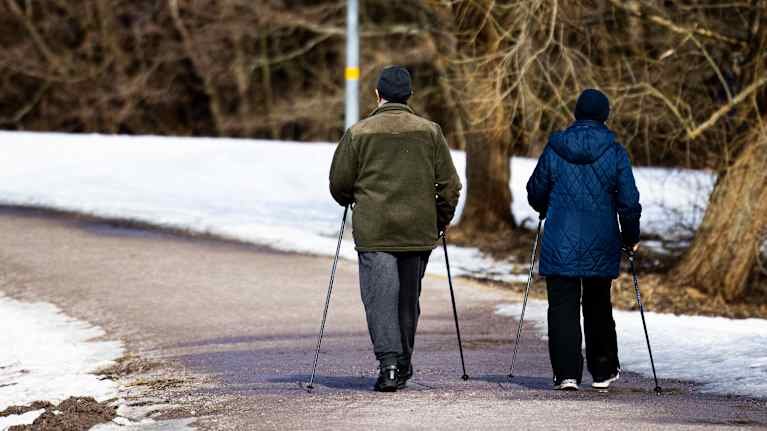
- Millions of Americans are at risk of developing dementia, but early detection and proactive measures could help delay its onset and mitigate its effects, according to a new report.
- The report indicates that cognitive ability, lifestyle factors, and physical health can predict dementia risk up to two decades before symptoms appear.
- Among these factors are having diabetes, not exercising, and not having worked or having worked a very few years.
- Addressing barriers such as cost and accessibility could expand routine cognitive testing and connect more people to treatments and resources in the critical early stages of dementia.
According to a new report by the nonprofit research organization RAND, cognitive ability, functional limitations and physical health can strongly predict the risk of developing dementia up to 20 years before its onset.
Although the current uptake of cognitive testing among older adults remains low, research suggests that participation would increase if the tests were free, easily accessible and supported by improved treatment options.
Early detection of Alzheimer’s disease and related dementias is especially crucial for the 58 million Americans over the age of 65, as existing disease-modifying treatments are effective only in the early stages.
Yet, only about 16% of individuals in this age group undergo cognitive assessments during routine visits with their primary care providers.
RAND researchers conducted three studies to identify those at greatest risk for cognitive impairment, explore ways to increase cognitive testing among older adults and encourage at-risk individuals to maintain brain health care.
The first study analysed cognition and dementia data from the Health and Retirement Study, a nationally representative survey of approximately 20,000 older U.S. adults and their households, ongoing since 1992.
This analysis identified lifestyle factors such as lack of exercise, obesity and not engaging in hobbies at age 60 as key predictors of dementia risk, from a review of 181 potential risk factors.
In addition to lifestyle influences, the study found regional variations in dementia risk, with individuals born in the South facing a significantly higher likelihood of developing dementia, even after accounting for other variables.
While Black, Hispanic and lower-income individuals showed a higher risk, race and ethnicity were not independent risk factors once education and income were considered.
Parental health, family size and marital history were not significant predictors of dementia.
The research highlights the importance of adopting a lifestyle that supports brain health throughout life.
Understanding what increases the risk of dementia can help doctors and policymakers identify people most at risk and provide the right support to slow down or lessen the impact of cognitive decline.
The study found the following factors as strong predictors of developing dementia:
- Having poor physical health,
- Experiencing a stroke,
- Having particular genes that strongly predict a future risk of developing cognitive impairment and dementia,
- Not having a private health insurance plan at age 60,
- Never having worked or having worked only a few years,
- Having diabetes or a body mass index (BMI) of 35 or more at age 60,
- Never drinking alcohol or drinking excessively,
- Never exercising,
- Scoring low on various physical tests (such as grip strength, walking speed and balance etc.),
- Being less conscientious,
- Having low engagement in hobbies and activities that involve learning new things.
Another study explored how people respond when facing cognitive issues.
Using data from a long-term U.S. survey, it found that newly diagnosed dementia patients are far more likely to act, noting that 25% of respondents sought financial help from children, compared to just 2% of those without a diagnosis.
Even without a formal diagnosis, 29% of people showing signs of dementia sought financial help, suggesting many recognise changes and begin planning early.
A diagnosis often prompts practical steps like creating a living will, assigning power of attorney or moving in with family for support.
A third study found that out-of-pocket costs are the biggest obstacle to accessing cognitive assessments and dementia care.
While 80% of Americans said they would get a free cognitive test, this number dropped by half when a $300 fee was introduced.
Most respondents said they’d seek care if better treatments were available. About 60% would use a therapy that could help them stay independent for three extra years.
Expanding access to affordable cognitive tests could help more people plan for the future and benefit from current and upcoming treatments.
Two experts, not involved in these studies or the writing of the report, spoke to Medical News Today.
Clifford Segil, DO, neurologist at Providence Saint John’s Health Center in Santa Monica, CA, said how it is “refreshing to read an article about dementia in 2024 not supporting using amyloid medications to treat it.”
“This report noted in common sense language risk factors which I see increase people getting dementia which included a stroke, poor health, diabetes. I was surprised to see data support a history of only working for a few years or not having private health insurance at age 60 being increased risk factors for developing dementia. Refreshing to read an article on dementia not supporting early diagnosis with a blood test which clinicians like me strongly disagree should be done.”
— Clifford Segil
Ryan Glatt, CPT, NBC-HWC, senior brain health coach and director of the FitBrain Program at Pacific Neuroscience Institute in Santa Monica, CA, said the study about the early predictors of cognitive impairment and dementia “provides valuable insights into early risk factors for dementia using a large, nationally representative sample.”
“It highlights modifiable and non-modifiable risk factors, including lifestyle behaviors, socioeconomic status, and health markers,” Glatt said.
Glatt also touched on some of the study’s limitations.
“While the report is robust in its methodology, its reliance on observational data limits the ability to establish causation,” he said.
“For instance, factors such as physical activity and social engagement are associated with lower dementia risk, but the study cannot definitively determine whether these behaviors prevent cognitive decline or are simply markers of better baseline cognitive health,” he explained.
Segil noted that “the implications of this Rand study are there are clear things people can do for ‘brain health’ to prevent dementia.”
“This paper advised performing physical exercise, working additional years, engaging in hobbies and novel information activities after retirement, and maintaining good physical health are likely to prevent someone from developing dementia. I think these lifestyle modifications should be shared with anyone trying to avoid getting memory loss or dementia as they age.”
— Clifford Segil







